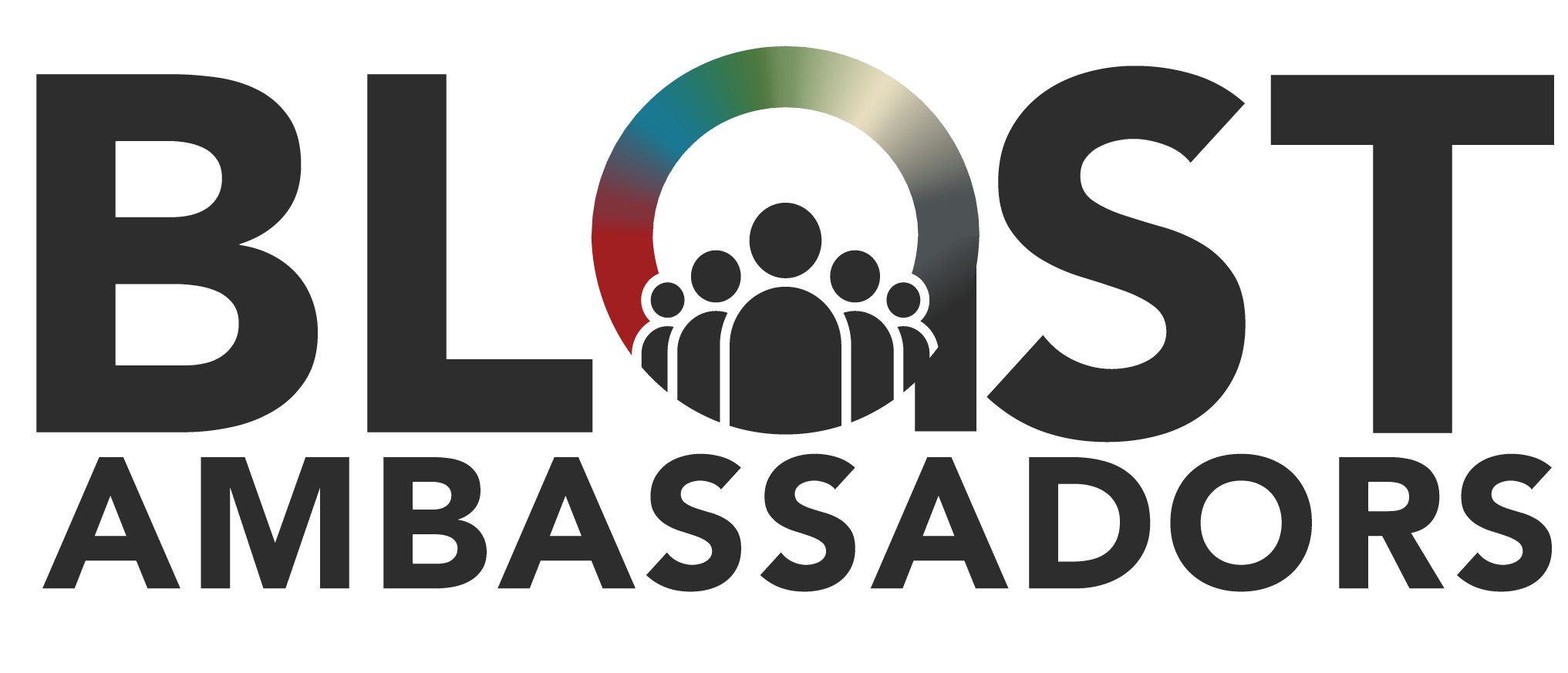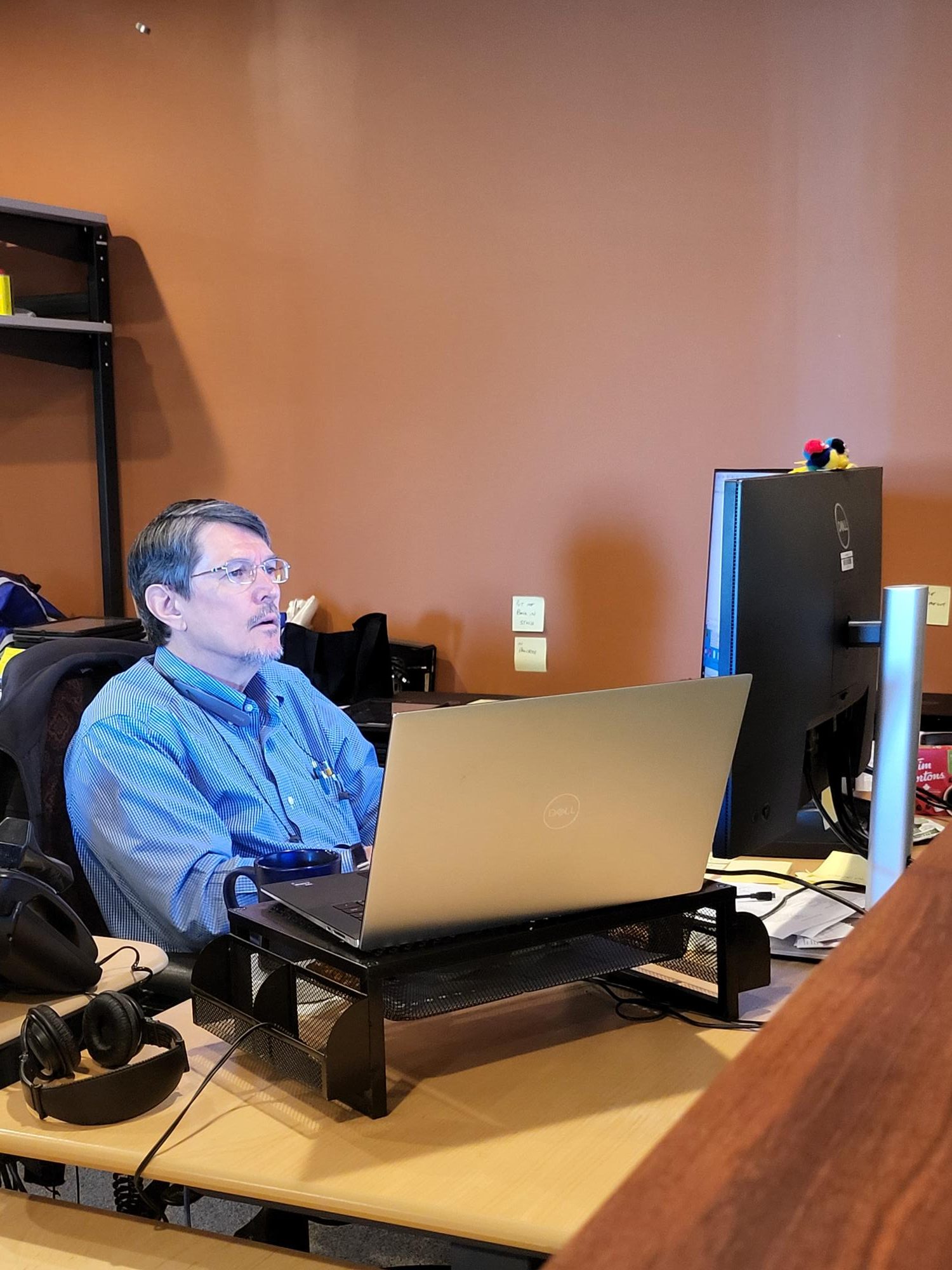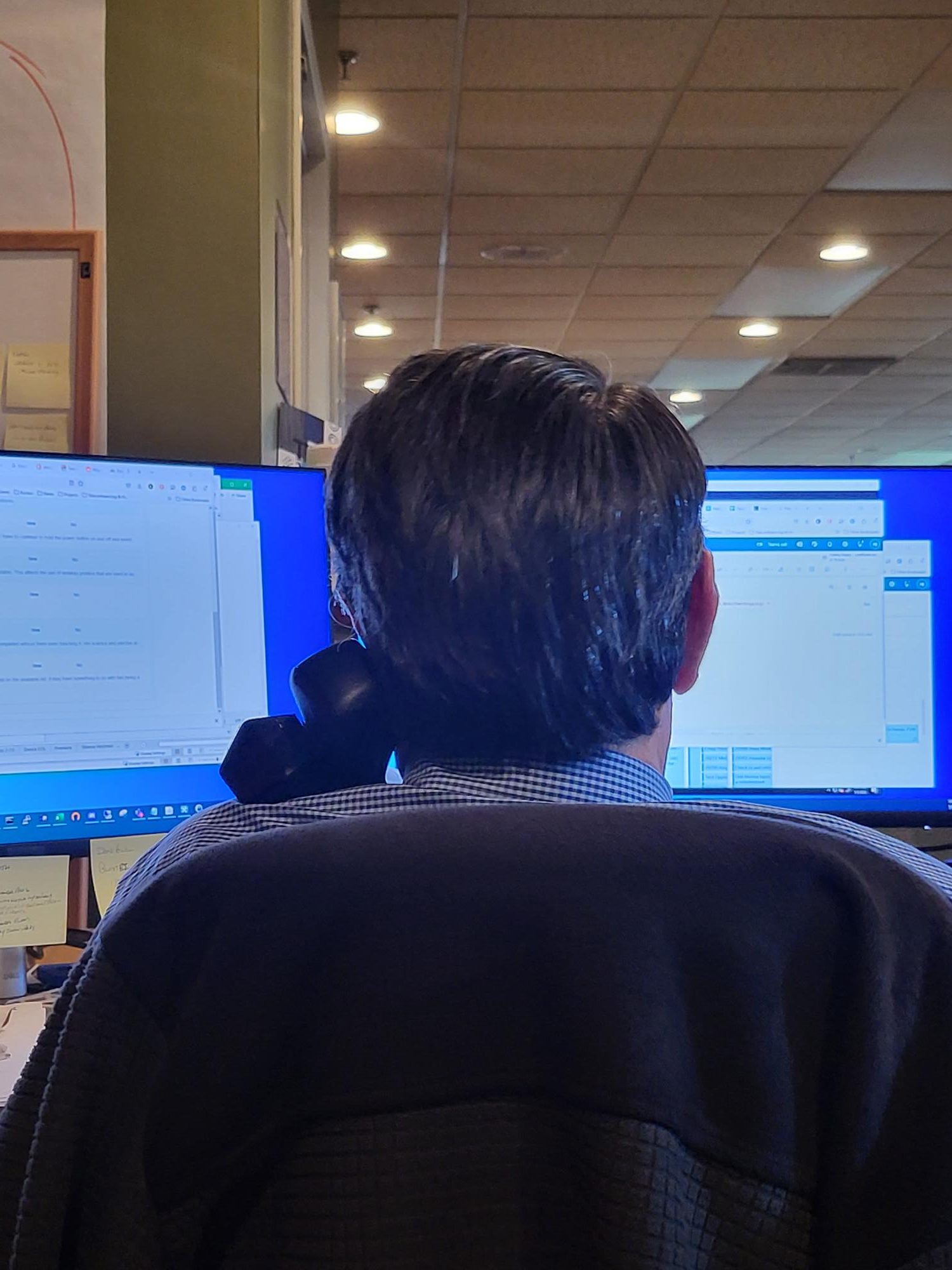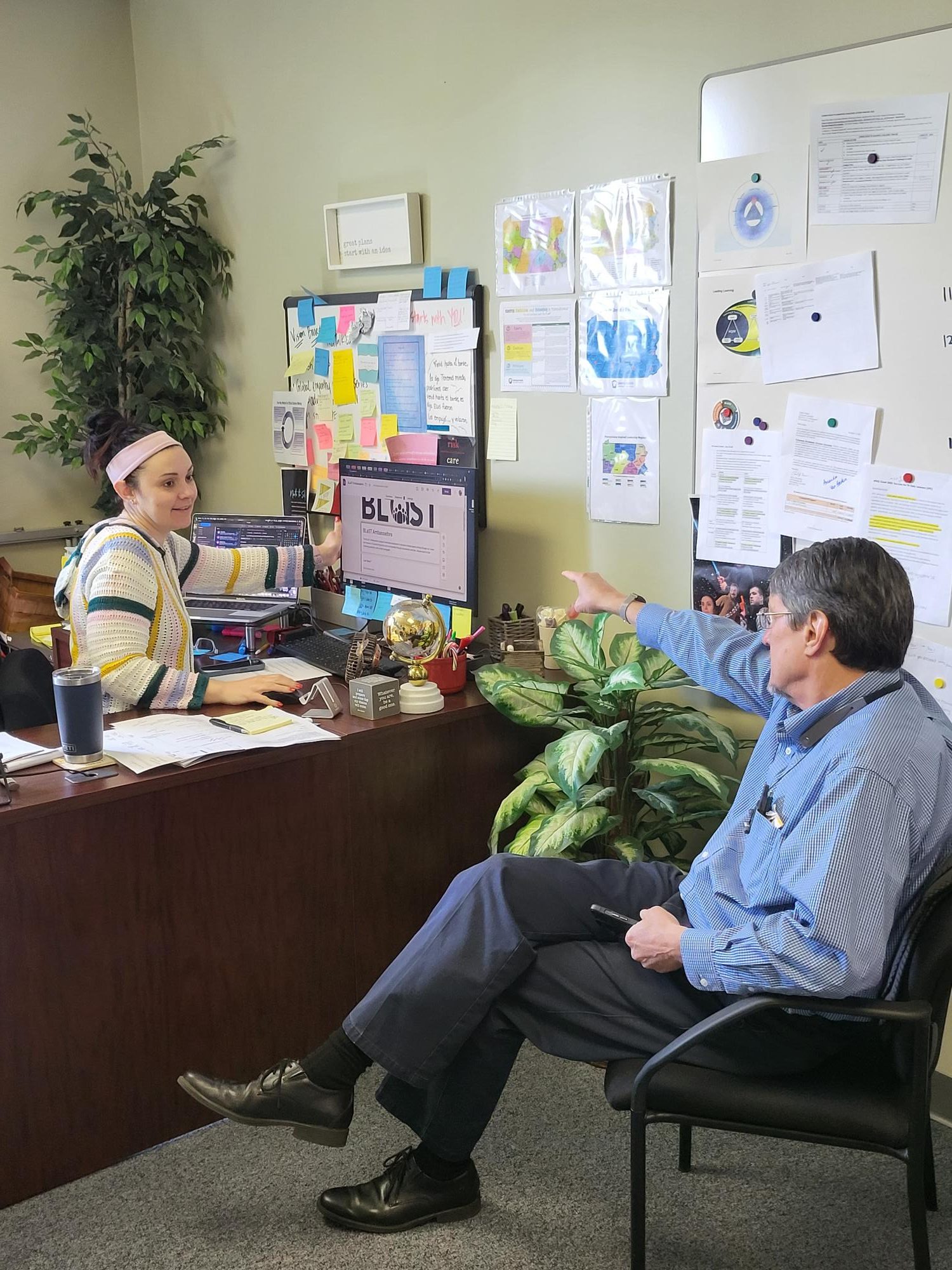Edward Ploy
A Snapshot into the Life of an IT Specialist
Checking emails, working in our servers and utilities, Most always at the computer
Phone in my ear, helping someone with a password problem
Meeting with organizational partners to find solutions
A Day in the Life of an IT Specialist
People come to their careers for all kinds of reasons. I work in computers now because I’ve always liked to know how things work and to play with gadgets.
But I’m also interested to know how the organization works. In my current role, I have many opportunities to see how the Intermediate Unit works, and its interactions with and influence on the lives of the students it serves. I’m able to get out into the classrooms and meet the people who are making it happen. I also work with the people in the offices “back home” that also play a big role in making the IU a great place, whether it’s looking into new curricula and methods, purchasing and accounting for the financial aspect, reaching out into the community, or any of the other myriad things that go into such a wide-spread organization.
My own role is primarily to make sure that the technology works, but I also get to see what other people’s roles are and how we all fit together, and for me, that’s a pretty neat thing.
Get to Know Our Ambassador
Transcript
Welcome to BLaST the AirWaves with BLaST Intermediate Unit 17. Here at BLaST Intermediate Unit 17, we strive to transform lives and communities through educational services. On this podcast, we will provide you with educational solutions for all, no matter the learning environment. So teachers, administrators, caregivers, what are you waiting for? What would happen if we started questioning “What if”? What if we had a positive perspective on education? What if we flipped the switch on education? What if we were the solution?
“Today we have the pleasure of speaking with Ed Ploy, one of our BLaST Ambassadors here at BLaST Intermediate Unit 17 and within our organization, Ed works in the Division of Technology as an IT Specialist. So, Ed, thank you for joining us today to discuss your role within the organization and also as an Ambassador. Are you ready to blast the airwaves with us?”
“I do believe that I am.”
“Wonderful. So why don’t we start with you telling us a little bit about yourself and also your role within the organization.”
“I will start with my role in the organization. I sit primarily in a chair that serves to make sure that the teachers in the field and the staff of the IU are supplied with technology and that that technology works correctly for them at all times. I make sure that the printers are printing and the video players are playing video and the laptops are working as computers and mostly make sure that when people want to get things done with computers, the computers that they have are doing what they want them to do. My background before I came to the IU, I was self-employed as a computer service technician working around Lycoming and Clinton County and the surroundings, fixing computers and fixing printers, ect. and so I think that I was fairly well primed for the role that I’m playing at the Intermediate Unit now before that, I worked in the theater as a production manager and lighting designer and decided in my forties that it was time for a career shift and so, I started working in computers.”
“Yeah, you’re just a jack of all trades. Not to mention your hobby of fencing, because I always think that’s impressive. I feel like you’re the celebrity in the Intermediate Unit because everyone knows who you are and you always come to save the day when there’s tech issues.”
“Well, I’m certainly among the more visible faces. I don’t know that I would call myself a celebrity, but yes, it’s oftentimes me who answers the phone and me who is walking in the door to bring the new laptop or to get the toner cartridges and ect. that everybody needs.”
“Yeah, that’s awesome. So, you mentioned about your past history and your previous employment opportunities and you started, you gravitated toward the Intermediate Unit then. So as we, as I can imagine, the Intermediate Unit is very different than your previous roles. So what made you come to an Intermediate Unit and, and continue to work with the Intermediate Unit?”
“Well, I have to say that what attracted me to the Intermediate Unit was growth, I suppose you would say. I have been working in small offices and in people’s homes for quite some time and wanted to learn more about what is called “enterprise computing”, which is the larger scale stuff where you have multiple buildings and campuses that you have to serve in, upwards of 50 to a hundred, 200 people to keep happy at any one time. I wanted to see what it was like in that environment and that’s what brought me here. But what has been keeping me here is the very interesting and challenging work that the people out in the field are doing, in our facilities and in our early intervention clinics, ect, working with the kids.”
“Yeah. Wonderful. And then, you know, as we talk about this, it seems like what stayed consistent, other than your work with the theater, is the IT specialist component. So what made you choose to be an IT Specialist?”
“Well, ever since I was a kid, I’ve been interested in gadgets. I was always taking together anything or taking apart anything that was electrical or electronic and my Dad had one rule about that. He said, anything you take apart, you have to be able to put it back together so it works, and so I learned to fix things. Over the course of my life, it’s been stereos and TVs, or it’s been cars or it’s been theatrical lighting equipment and now it’s computers and I’m just into gadgets and electronic equipment.”
“I’m going to ask a silly question, but I’m sure some of our listeners may be wondering, what does “I.T.” stand for?”
“Information Technology.”
“Wonderful. Thank you. And I guess I do also have to ask, is there anything that you did take apart that you couldn’t put back together that your Dad got upset with you with?”
“Yeah. When I was a teenager, I had a 1970 G T O that I blew the engine out of, and I took it apart to rebuild the engine and never did get it put back together.”
“Oh man. Well, there’s surely a lot of things here at our office that you do put back together, so I’m glad that your Dad really instilled that in you too.”
“I try and if I can’t get it back together, there’s half a dozen other people that have knowledge in different areas than I do and we all help each other out.”
“Yes, that’s very true. So part of this Ambassador program, you got to shadow another employee and I know you were hanging out with our Division of Educational Planning. So, what did you notice? What did you learn about with your time with our division?”
“Well, I guess the main thing that I learned was just how many balls you all have to keep in the air – how far flung the division is. I didn’t realize that there were as many of you working in that division as there are working in it and how many different aspects of the educational field you touch, not only educational, but practical, dealing with kids in their transition from school into real life, figuring how to bring students into the classroom and how best to teach them while they’re in the classroom, working with the somewhat unusual emotional difficulties that some kids have. You folks work in many, many more areas than I had originally thought.”
“Yeah, and I do appreciate, you know, as I’m debriefing with all of you and hearing all of the Ambassadors stories, there’s just a lot of things in this organization and I don’t think it’s just unique to BLaST Intermediate Unit, I think all 29 Intermediate Units across the state, I think, they’re just so big and complex that it’s hard so it’s a really unique opportunity for the Ambassadors for you guys to see other avenues and I think it is really awesome to hear your takeaways. So, the other question then, you know, you guys are our first class. We’re looking to start our second class. What were your biggest takeaways or “aha” moments during the Ambassador Program, or what’s some advice you would give to someone that’s joining this cohort next year?”
“I guess the advice that I would give would be to open your mind. We all work in our individual fields and of course we touch other divisions in one way or another but open your mind to getting a really serious grasp of what other areas of the organization do and what their concerns are, why they do what they do, and how they can interrelate with you. I think that I tried to be open to all of that as I’ve moved through the program and I would encourage anybody else to try to do the same.”
“ Awesome! Thank you. And it is my favorite time for my favorite part now, where I get to ask you five random questions about you outside of your professional life. I mean, I know I threw in about your fencing work but I’m going to ask you five questions about you and they’re pretty, they’re meant to be pretty quick, so you don’t have to elaborate on them if you do not choose to. So, Ed, what is your favorite genre of music?”
“That depends on the day of the week, sometimes. I listen to just about everything. I grew up as a progressive rocker, actually when I was younger, it was, everything was folk music and then I went into progressive rock and for a while I listened to a fair amount of kind of punk rock music and new waves in the nineties, I was a big alternative guy. Nowadays I’ll listen to just about anything so if you were to tune in my Discover playlist on Spotify, you could find anything from the Bonzo Dog, Duda Band up through the Atlanta Symphony.”
“What a wide variety right there. In our role, that Spotify playlist is very important because we are traveling a lot, so it keeps you awake then on your toes. What about your favorite read? What about your favorite, when you pick up a book or a magazine, what do you enjoy reading?”
“Well, currently I’m reading fencing coaching tests and I’m kind of moving into reading anthropology, sociology, mythology. I’m reading Joseph Campbell’s Hero with a Thousand Faces right now on audiobook while I’m traveling. I finished a book that I can never remember the full title of, because again, it was on audiobook but it was a history of anthropology basically.”
“Yeah. Interesting. Good. What about your favorite TV show, Netflix series, Hulu, whatever’s on your TV?”
“Well, we like Ted Lasso. We were watching Mandalorian, I guess we’re all caught up on that one. Usually television is fairly light and if I can’t find anything like that, then I’m watching the baseball game.”
“Who’s your favorite baseball team?”
“Oh, Pittsburgh Pirates. Absolutely! And they’re on a hot streak right now. They are! They’re actually winning so I don’t know what I’m gonna do about that.”
“There you go. What about your favorite food or restaurant?”
“Currently, we are liking Laziza here in Williamsport, it’s a Pakistani Indian restaurant.”
“Interesting.”
“I’ve been talking it up to a number of people. It’s over on Third Street across from Farrington Place and they make really pretty good Indian food. I like the Saag Paneer. If we don’t go there, I just like to try new things.”
“Wonderful. And the last one, this might be a difficult one cause I know you don’t even have the script in front of you or anything. What about your favorite motto or quotes?”
“Oh, I don’t know about my favorite but here’s one I use on my fencing students every so often. It’s a quote from Mike Tyson and Mike says, “everybody has a plan until they get punched in the face”. “
“That applies to a lot of things.”
“Yes.”
“That’s great. That’s great.”
“No, that’s the best example, but I like to use that one because it gets your attention.”
“Yeah, well I love hearing all of the ambassadors are quotes and mottos. I think they’re all really great to, like, I should just have it on my wall here, so I just remember them. So Ed, we can’t thank you enough for your time today. We know our listeners, myself included, really enjoyed it and if our listeners want to learn more about your role here at the Intermediate Unit, they can always visit your ambassador page at www.iu17.org on our homepage for the Ambassador Program and then they can connect with you. So, Ed, it’s been a blast, no pun intended, again, thank you for taking some time today to blast the airwaves with us and our listeners. It’s a pleasure to have you on the podcast, and I know I’ll probably see you in about one minute when you walk back to your office, so we’ll catch up.”
“Well, thank you very much for having me. I had a good time all year and for this interview.”
“Thank you.”
We would like to thank you for blasting the airwaves with us today. If you like the show, please subscribe or leave a review. If you want to know more, check out www.iu17.org for further resources and show notes. As always, we want to thank you for what you do every single day. Remember, keep shining! We’ll be back next episode to provide you another educational solution for all as we continue to transform lives and communities through educational services.




